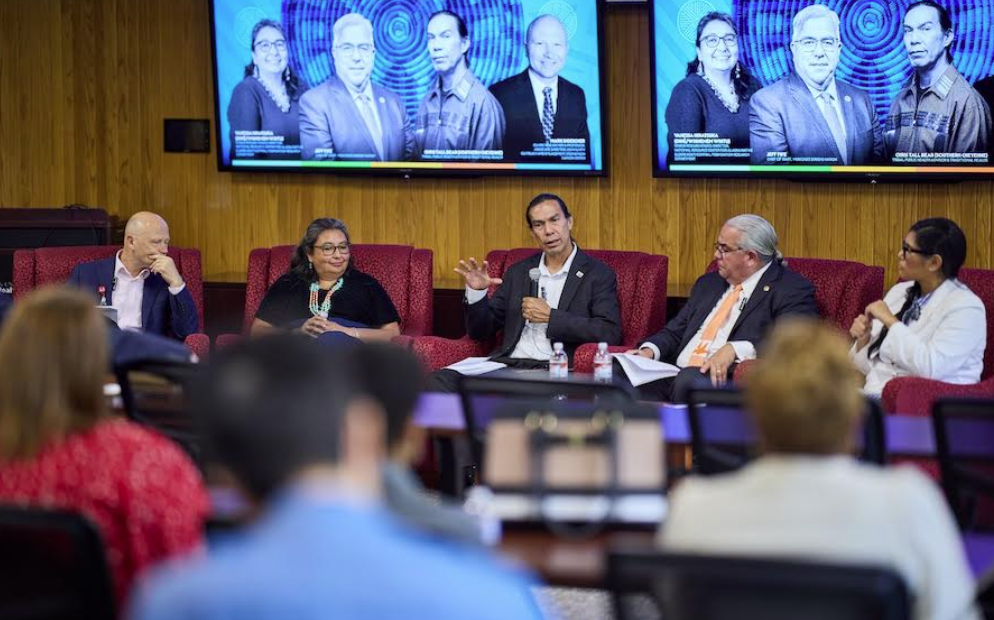
- Details
- By Native News Online Staff
On June 17, the Native Nations Center for Tribal Policy Research—partnering with Tana Fitzpatrick, associate vice president for tribal relations at the University of Oklahoma, and the OU Center for Faculty Excellence—hosted the latest session in its Ethical Tribal Engagement Series at the OU Health Sciences Center. The event drew nearly 70 in-person participants and more than 120 virtual attendees.
Focusing on Indigenous perspectives in health research, governance, and traditional healing, the event fostered meaningful dialogue between tribal leaders, researchers, and university representatives. The Ethical Tribal Engagement Series aims to bridge institutional and tribal worldviews, promoting shared understanding, mutual respect, and responsible collaboration between universities and sovereign Tribal Nations.
Panelists included:
- Jeff Fife, Chief of Staff, Muscogee (Creek) Nation
- Chris Tall Bear (Southern Cheyenne), Tribal Public Health Adviser and Traditional Healer
- Dr. Vanessa Hiratsuka (Diné/Winnemem Wintu), Senior Researcher and Co-Director, National Resource Center for Alaska Native Elders, Southcentral Foundation Research Department
- Dr. Mark Doescher, Professor and Associate Director of Community Outreach and Engagement, OU Health Stephenson Cancer Center
Moderated by Fitzpatrick, the session encouraged open conversation and thoughtful insight from the panelists.
“Research involving Tribal Nations must center tribal voices,” Hiratsuka said. “My work is about amplifying what our communities tell us about health and wellness. Being in community means asking for help, offering humility and building reciprocal relationships.”
Tall Bear discussed the distinct role of traditional healing, which emphasizes empowerment and cultural immersion. “Western medicine treats patients as recipients of care. In traditional healing, patients are active participants in their own health, connected through language, ceremony and heritage,” he said.
Fife underscored the importance of tribal leadership in health care, citing the Muscogee Nation’s recent acquisition of a former cancer treatment center in Tulsa as an example of self-determined, community-focused health initiatives.
Doescher added, “Every tribal partner I’ve worked with shares a common goal—improved health outcomes. Truly groundbreaking research depends entirely on trust.”
The panel concluded with a shared call to action: strengthen ethical, inclusive, and reciprocal partnerships. Fife emphasized the long-term vision: “We have tribal citizens enrolled at OU, OSU, and other universities. We want them to return and build our communities. We are long-term partners who can shift worldviews.”
To watch the full event and learn more about the Native Nations Center for Tribal Policy Research, visit [insert appropriate link or webpage].
More Stories Like This
Navajo Council Committees Tackle Grazing Enforcement, Code RevisionsU.S. Must Fulfill Obligations by Protecting Programs
50 Years of Self-Determination: How a Landmark Act Empowered Tribal Sovereignty and Transformed Federal-Tribal Relations
Trump Veto Stalls Effort to Expand Miccosukee Tribal Lands
Oneida Nation Responds to Discovery Its Subsidiary Was Awarded $6 Million ICE Contracts
Help us defend tribal sovereignty.
At Native News Online, our mission is rooted in telling the stories that strengthen sovereignty and uplift Indigenous voices — not just at year’s end, but every single day.
Because of your generosity last year, we were able to keep our reporters on the ground in tribal communities, at national gatherings and in the halls of Congress — covering the issues that matter most to Indian Country: sovereignty, culture, education, health and economic opportunity.
That support sustained us through a tough year in 2025. Now, as we look to the year ahead, we need your help right now to ensure warrior journalism remains strong — reporting that defends tribal sovereignty, amplifies Native truth, and holds power accountable.
 The stakes couldn't be higher. Your support keeps Native voices heard, Native stories told and Native sovereignty defended.
The stakes couldn't be higher. Your support keeps Native voices heard, Native stories told and Native sovereignty defended.
Stand with Warrior Journalism today.
Levi Rickert (Potawatomi), Editor & Publisher


